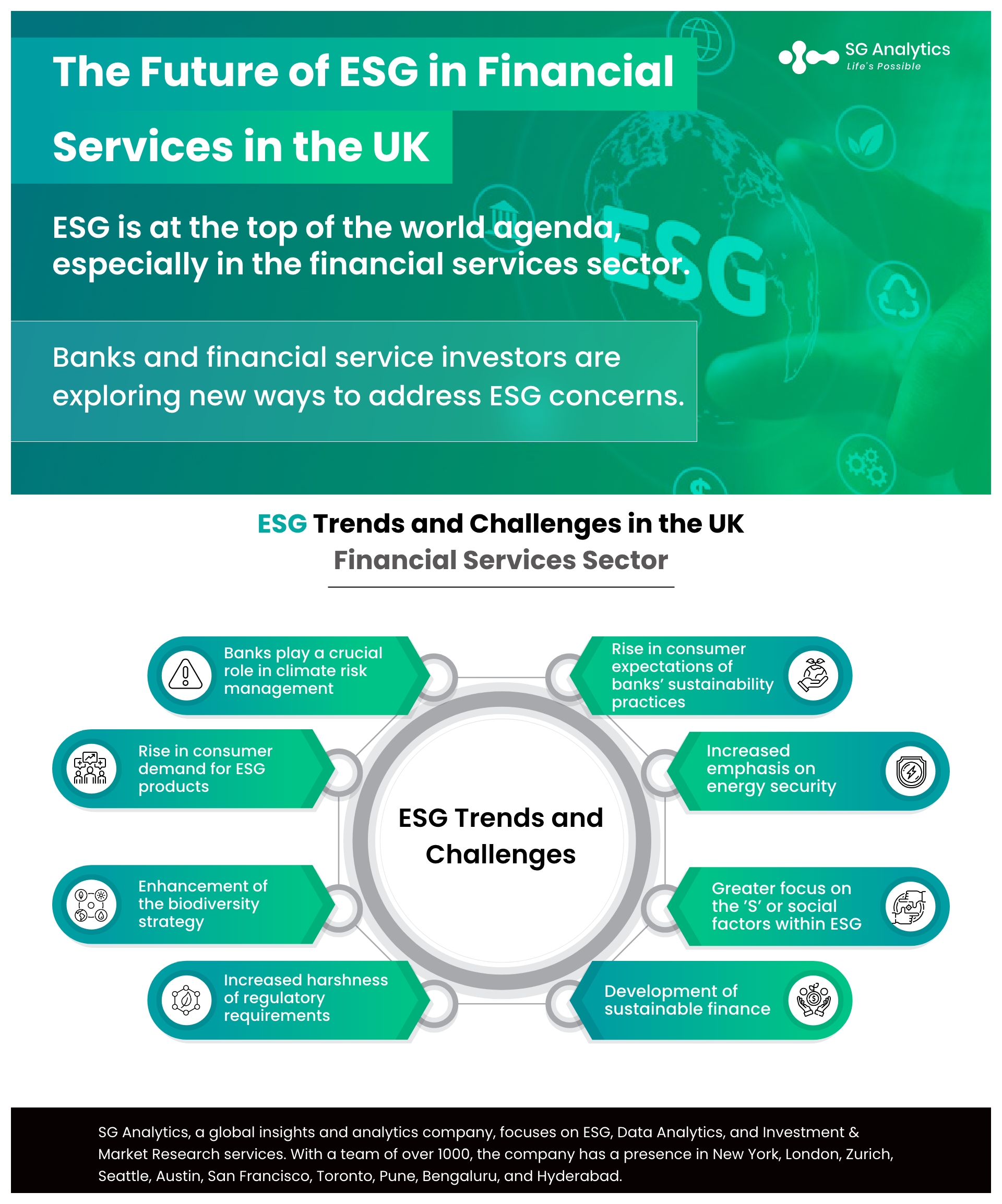ESG is at the top of the world agenda, especially in the financial services sector. The financial sector is at the forefront of the ESG shift, which benefits the industry as a whole and the planet as a whole. The business and financial landscape is about to undergo a dramatic shift; what does this mean?
Finding ways to combat climate change has entered the mainstream discourse of every sector of society. Sectors across the UK have evaluated how they may change their practices to become more climate-friendly and sustainable in light of the government's implementation of its objective to fully decarbonize the economy by 2050.
Banks and investors in the financial services industry are also looking for new ways to address environmental, social, and governance (ESG) concerns. They've made it a goal to supply goods and services that prioritize and advance sustainable goals. For example, sustainable funds apply environmental, social, and governance (ESG) standards to evaluate the social and environmental effects of investments, while sustainable bonds help finance initiatives with the same goals.

ESG Trends and Challenges in the UK: Financial Services Sector
Banks play a crucial role in climate risk management
When examining financial services as a whole, various actors perform a variety of roles in relation to environmental issues. As intermediaries and purveyors of credit to industry, banks play a crucial role in managing the transition from a fossil fuel-based to a renewable energy-based economy.
As people become more aware of climate change and its monetary consequences, banks are beginning to realize the importance of their role in climate risk management. They should analyze their loan and investment portfolios for exposure to climate-related risks and take steps to reduce such dangers.
Both physical risks (like natural disasters) and transition risks (such as policy shifts and the rise of low-carbon economies) must be taken into account. The Paris Agreement calls for a global transition to a low-carbon economy, and banks should work to facilitate this process.
Rise in Consumer Demand for ESG Products
The demand for environmental, social, and governance (ESG) goods and services is on the rise. More and more people are considering the ethical and moral implications of their financial decisions and looking for ways to put their principles into practice.

In response to this need, more and more investment funds, green bonds, and other sustainable financial instruments are being created. In order to meet the needs of their consumers, financial institutions must respond to this trend by providing a wide variety of ESG investing opportunities.
Enhancement of the biodiversity strategy
Our global civilization is dependent on the ecosystem services nature provides, with biodiversity playing a crucial role in their delivery. The financial sector's operational activities, supply chains, financing, and investment decisions have an impact on biodiversity.
We anticipate a quickening of the biodiversity agenda in 2023, with businesses implementing policies that place a larger emphasis on how economic and business activity impacts the natural environment.
Biodiversity has emerged as a central tenet of ESG analysis. Banks and other financial institutions now see the value of adding biodiversity considerations in their overall planning and risk analysis.
The government is working on measures to mitigate threats to biodiversity and is looking at funding options for conservation and restoration initiatives. Assessing the environmental footprint of investments and using biodiversity-related criteria in lending and investment choices are two ways to improve the biodiversity strategy.

Increased harshness of regulatory requirements
In the effort to attain greater levels of sustainability in all sectors, regulation has been a central tenet. The Financial Services industry has experienced significant regulatory change in this area over the past several years, and this trend will continue until 2023. There is an increased emphasis on greenwashing and a reprioritization of sustainability on the regulatory agenda as a whole.
From the board to each of the fundamental business functions, the regulatory "one-page plan" must now be transformed into an operational reality. Those who employ a robust regulatory architecture and act proactively will ensure compliance and better align with the rising internal and external stakeholder expectations.
Rise in Consumer Expectations of Banks' Sustainability Practices
Consumers' expectations of banks' commitment to sustainability are growing in tandem with the demand for ESG goods. They count on financial institutions to uphold ethical standards in their lending, invest in environmentally friendly initiatives, and report their own ESG metrics openly. Customers want banks to demonstrate their support for environmental, social, and governance (ESG) principles, or they may look elsewhere. Therefore, in order to win the trust and loyalty of their consumers, banks must include ESG issues in their business plans and effectively convey these efforts to those customers.

Increased emphasis on energy security
ESG developments and expectations are inextricably intertwined with geopolitical, economic, and technological events. The requirements and expectations of stakeholders regarding ESG are closely tied to geopolitical issues.
As a result of the devastating conflict in Ukraine, we are experiencing energy insecurity, and the United Nations has issued a global call to not use this as an excuse to continue using fossil fuels and neglect renewables. As energy security and energy price inflation continue to have real-world consequences, we anticipate that this subject will dominate the airwaves in the first half of 2023.
In order to close the disparity in renewable energy sources, infrastructure, and supporting technology, the financial services industry will need to make concerted efforts to drive much-needed investment through sustainable finance instruments.
Greater emphasis on the 'S' or Social factors within ESG
Everyone has felt the urgency of climate change over the past few years, as evidenced by the pandemic, natural calamities such as the floods in Pakistan, and the calls for immediate action from the Small Island States and African countries at COP.
As previously mentioned, the social impact of a company's function in broader society is becoming an increasingly vital factor for investors to consider. The pandemic was a significant factor in bringing the social aspect of corporate behavior (both good and evil) to the forefront.

Previously secondary job functions have been reclassified as essential, resulting in a commensurate shift in employee bargaining power. Employees desire to work for employers who value and integrate ESG into their business, according to current trends. Similarly, the rising cost of living and the threat of widespread inflation are significant factors in employee motivation and have increased worker bodies' desire for better wages and working conditions.
The D&I equation will be modified to include E or equity so that firms that add equity will be more attractive to potential employees, leading to improved performance and a stronger bottom line.
Development of Sustainable Finance
The sectors of SLLs, sustainable bonds, and ESG funds have experienced phenomenal expansion. In addition, sustainable funding products have expanded from large corporations to small and medium-sized businesses as financial institutions commercialize ESG and increase client engagement.
Unquestionably, there is a rise in innovative and effective sustainable finance instruments that will advance the ESG agenda and give consumers alternatives that will result in substantial change.
In 2023, businesses will place a greater emphasis on upskilling their employees and advising and educating their consumers in order to help them capitalize on the transition to a low-carbon economy.

Initial Indications of Regulatory Coordination on Climate Reporting Standards
The regulatory supervision of environmental, social, and governance (ESG) issues has been fragmented, with different regions providing disclosure rules and guidance for businesses at various stages of development.
The lack of common standards and taxonomies across regions makes the administration of ESG issues more challenging, particularly for companies with a global footprint.
In Asia, for instance, ESG is acquiring traction but is still in its infancy. To evaluate ESG developments in the financial markets, investors and analysts are awaiting an accord on a reporting standard that would expedite the data collection process and generate higher-quality data.
Also read - How is Climate Change Impacting the UK Summer 2022.
To Sum Up
Banks may address these issues, challenges, and trends by increasing openness in reporting, collaborating with regulators to define common standards, investing in ESG expertise and resources, and forming partnerships with ESG-focused organizations. By doing so, financial institutions will be better able to meet the needs of their customers and meet the rising expectations of the ESG landscape, all while making a beneficial impact on the environment and society.

Opportunities exist in the financial services industry as a result of expanding customer demand for environmental, social, and governance (ESG) products and rising expectations for banks' sustainability practices. Implementation success and long-term consumer trust depend on resolving obstacles associated with data, regulatory, risk management, and organizational change.
Building a Greener and Sustainable Future
Before 2023, accountability was seen as pleasant, but that's starting to change. The epidemic refocused attention on sustainability and clean energy. Sustainability, previously an overarching issue, is now a key focus for every company. This presents a unique chance for businesses to evaluate their current state and consider how they could reduce their carbon footprint in the near and far future.
There is an increasing effort by companies of all kinds to combat the effects of climate change. They no longer include it in the brand's mission statement, but it has become a unifying notion that drives them to carry out essential tasks.
Companies are developing brand-new, long-term plans. They are working to lessen their environmental impact by using cutting-edge machinery. This allows them to protect their worker's interests while maintaining open communication. By 2023, brands that must put sustainability first will have already lost the race.
With a presence in New York, San Francisco, Austin, Seattle, Toronto, London, Zurich, Pune, Bengaluru, and Hyderabad, SG Analytics, a pioneer in Research and Analytics, offers tailor-made services to enterprises worldwide.
SG Analytics is an industry leader in ESG services, providing custom sustainability advice and research to aid deliberation. Contact us today if you are looking for an effective ESG integration and management solution provider to improve your company's long-term viability.









